
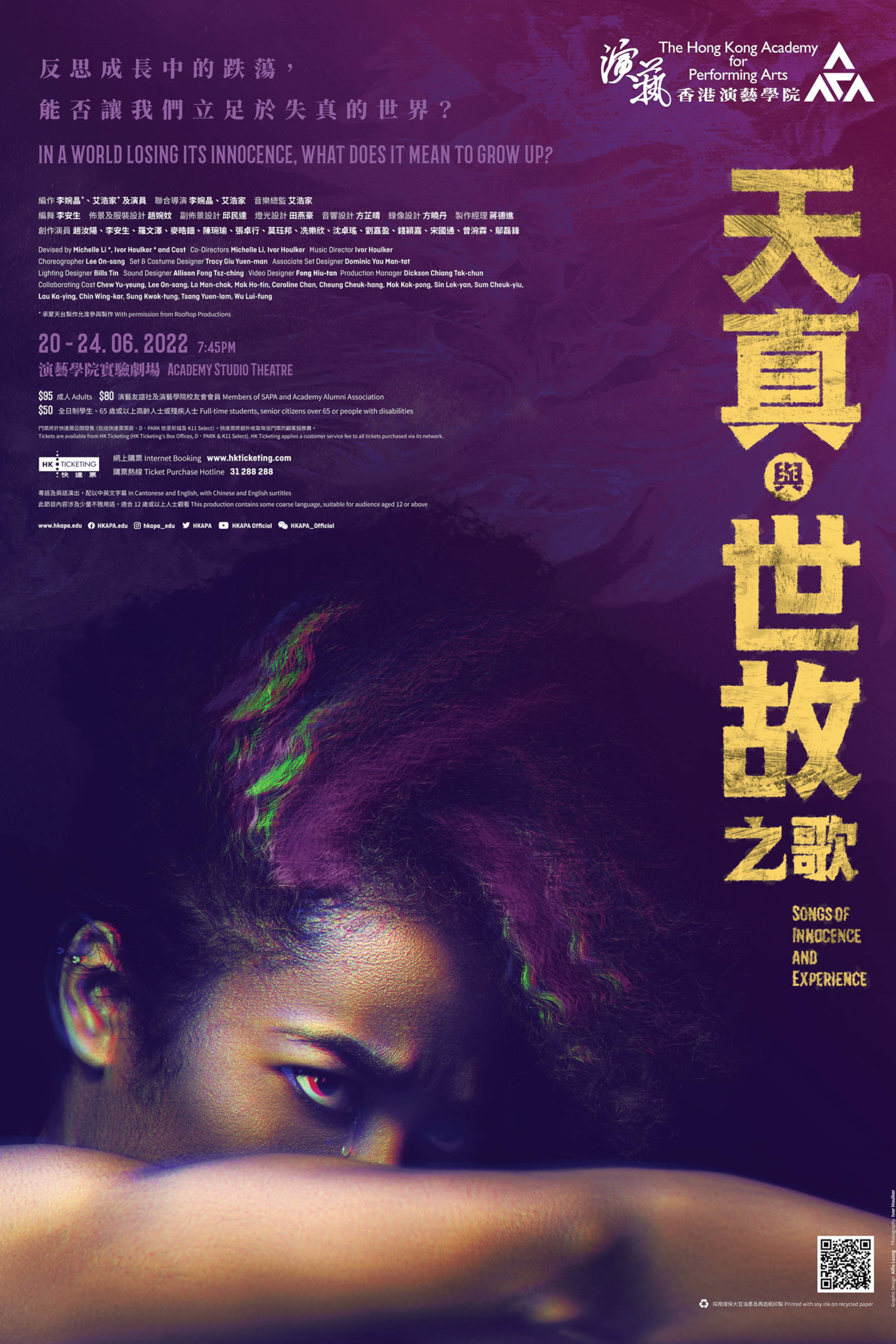
Songs of Innocence and Experience (HKAPA)
In a world losing its innocence, what does it mean to grow up?
Hong Kong APA Studio Theatre
1 hour 45 minutes
University students are caught between innocence and experience; between respecting conventions and rejecting the old in favour of the new.
Songs of Innocence and Experience was created by this group of young people, reflecting on their personal experiences growing up. Their intertextual work exists in relation to John Milton’s Paradise Lost; much in the same way as William Blake’s collection of illustrated poetry, Songs of Innocence and of Experience.John Milton wrote Paradise Lost after the English Civil War, describing how a group of fallen angels lost the war in heaven, and mankind fell by eating the forbidden fruit of knowledge. This great and controversial work inspired countless later works. Can Milton’s story, along with our own experiences and reflections on growing up, help us to find a way to face ourselves, the present, and the future?Cast

Lo Man-chak
Himself / God
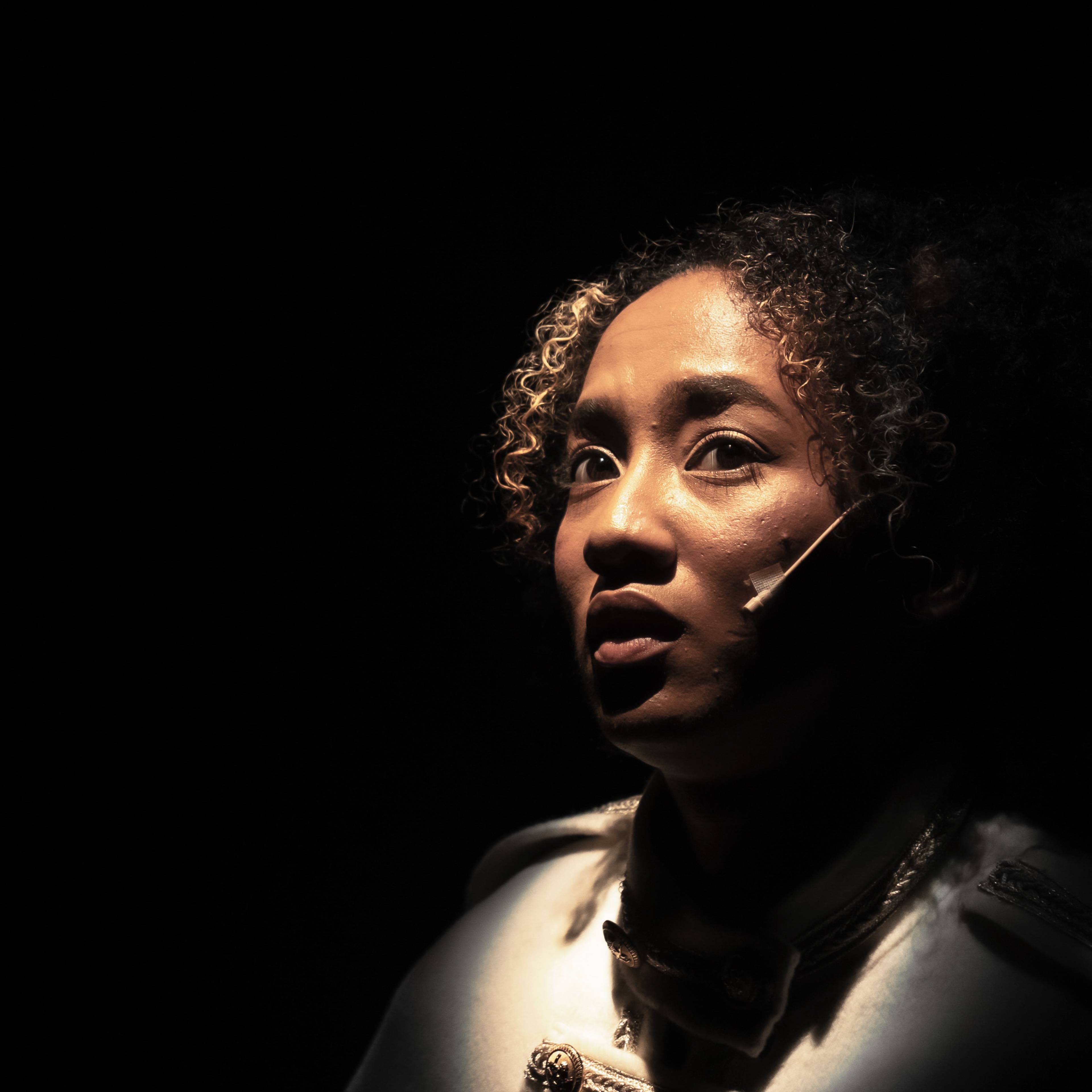
Caroline Chan
Herself/Satan (Lucifer)
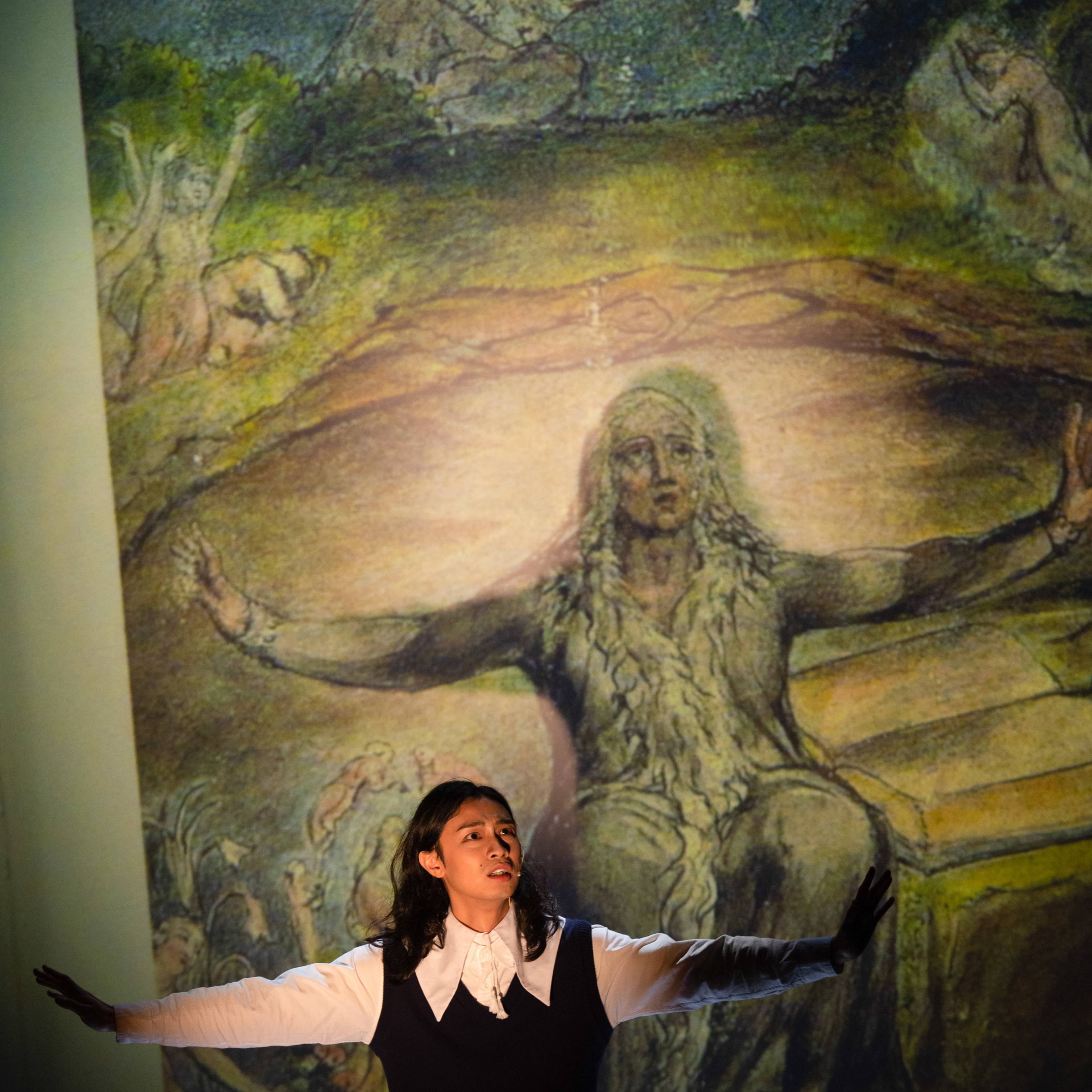
Mak Ho-tin
Himself / Milton / Beelzebub
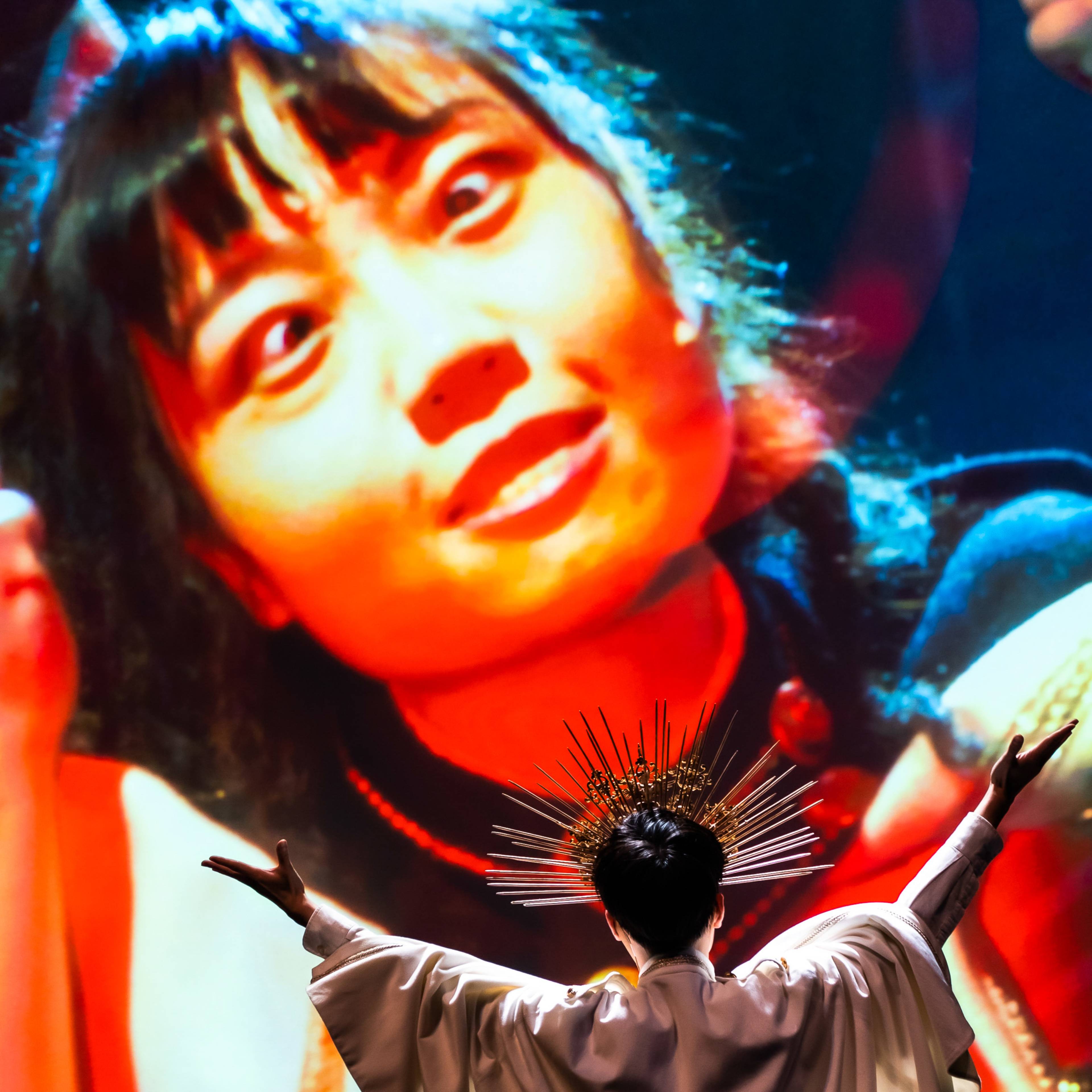
Lee On-sang
Herself / Moloch
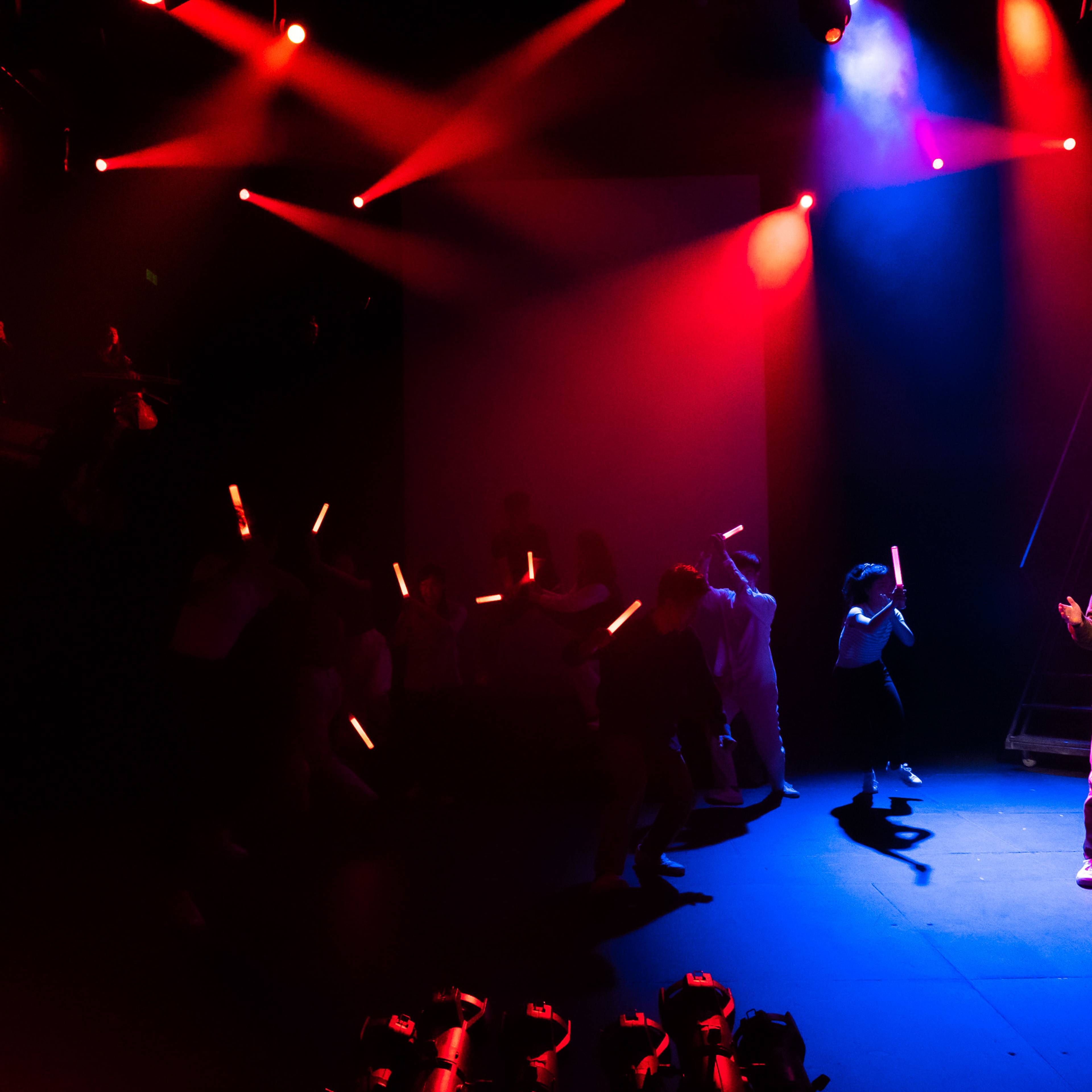
Chew Yu-yeung
Himself / Mammon

Sum Cheuk-yiu
Herself / Abdiel
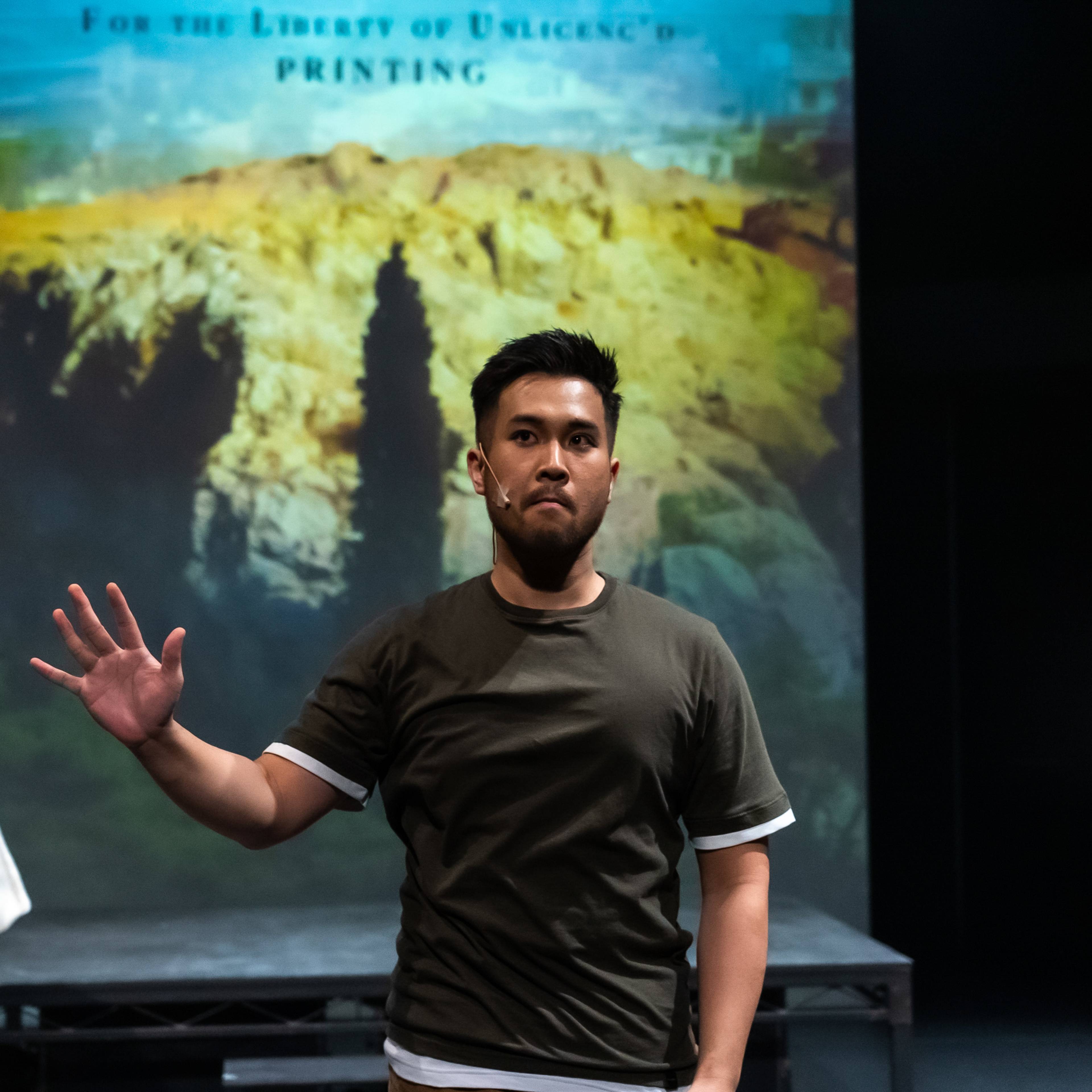
Mok Kok-pong
Himself / Michael
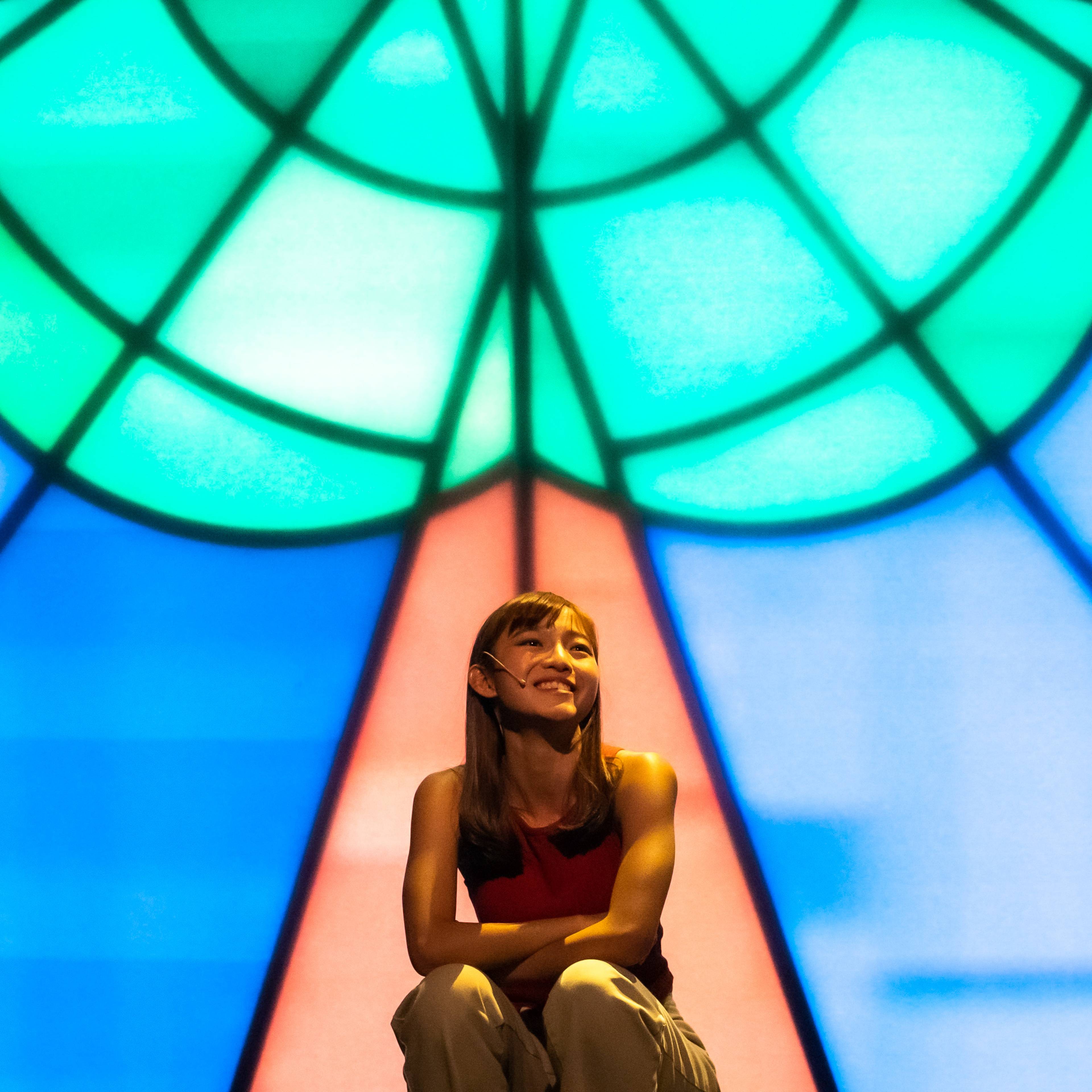
Sin Lok-yan
Herself / Eve / Angel

Cheung Cheuk-hang
Himself / Angel

Lau Ka-ying
Herself / Belial
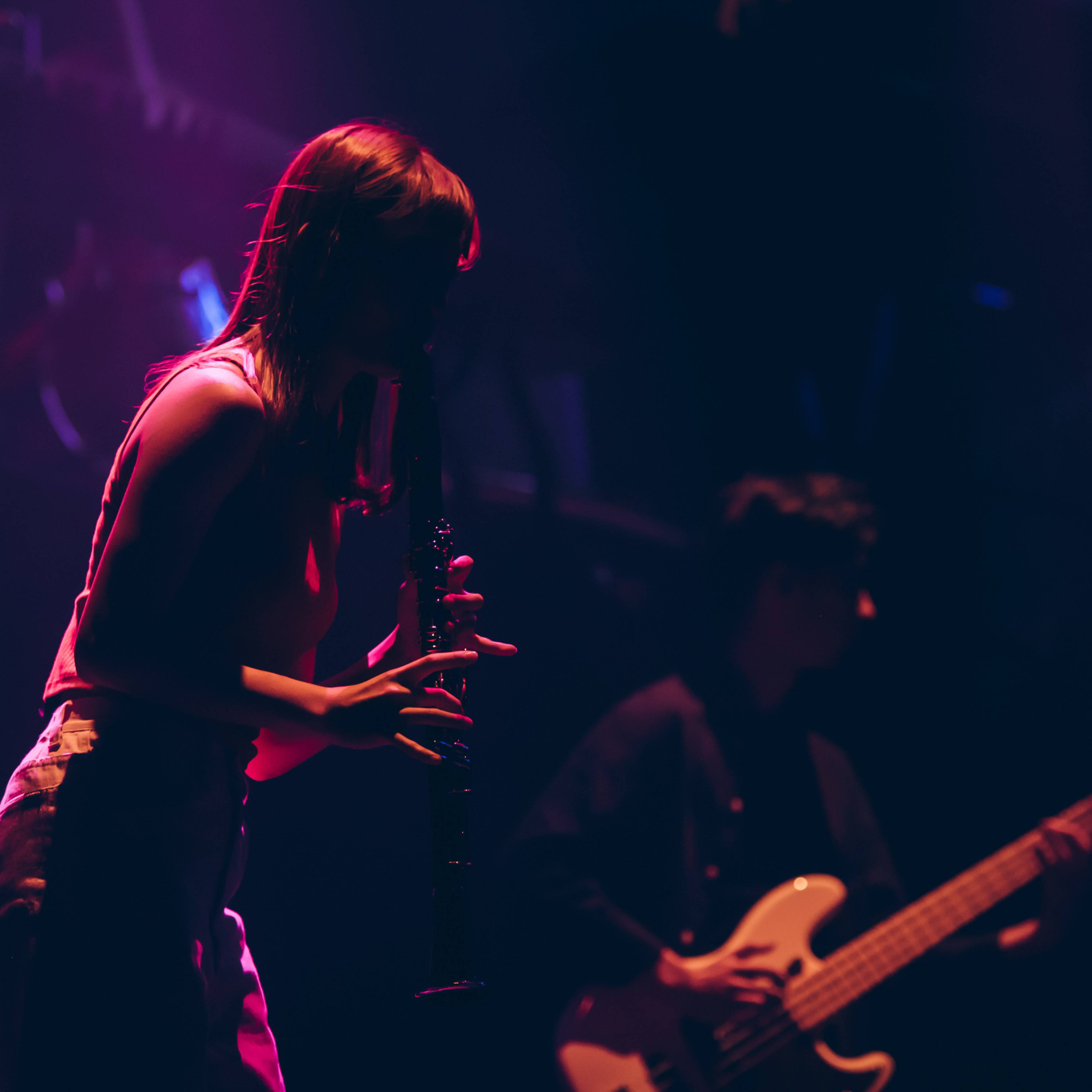
Wu Lui-fung
Band Leader / Guitar/ Bass / Sheng / Chinese flute

Chin Wing-kar
Guzheng / Guitar / Bass / Cello / Ukulele / Keys / Tubular Bells
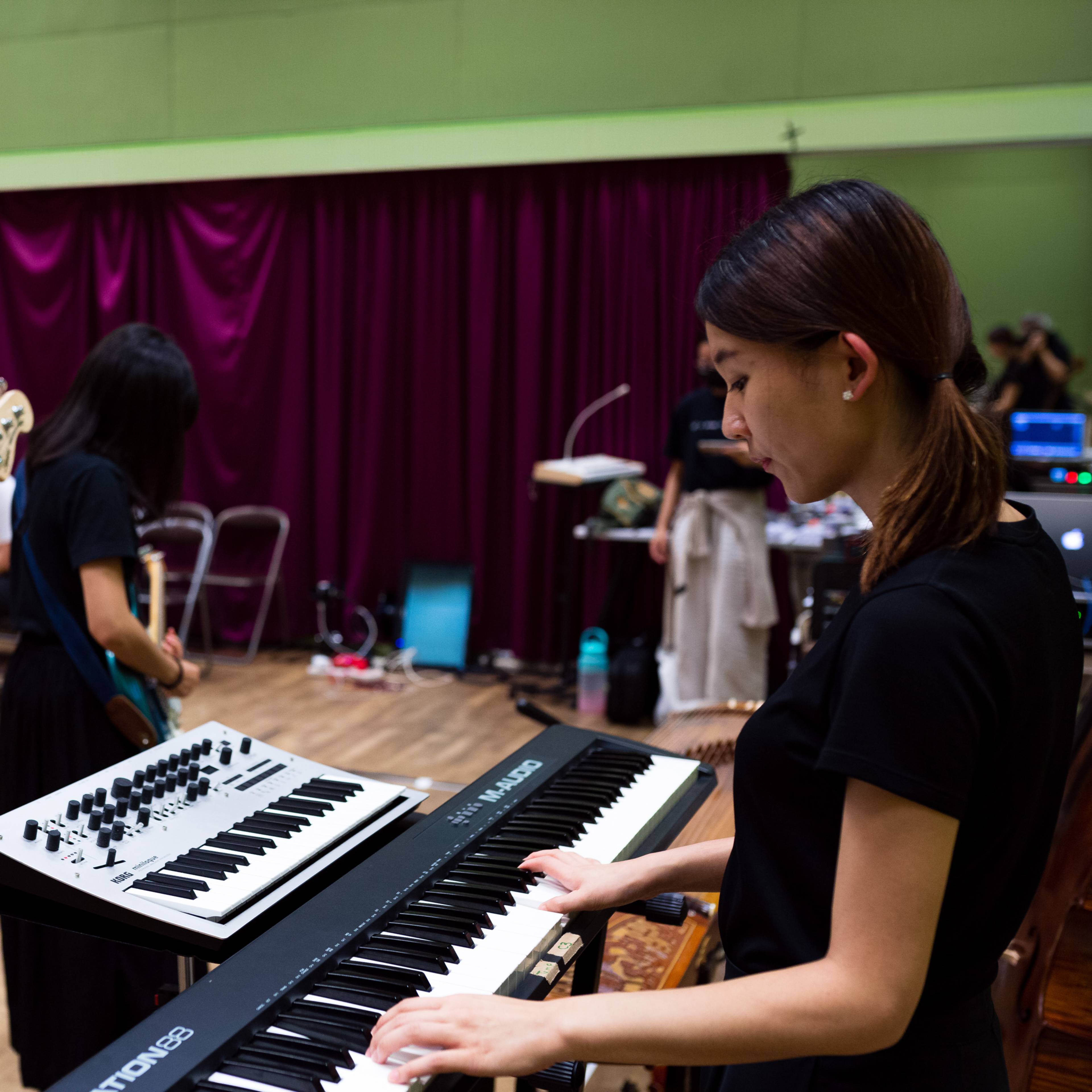
Tsang Yuen-lam Ivy
Keys / Tubular Bells / Cello / Bass

Sung Kwok-tung
Drums / Gong
Creative and Production Team
Directors | |
Producer | |
Choreographer | |
Collaborating Actors | |
Lighting Designer | |
Musician | |
Sound Designer | |
Set and Costume Designer | |
Video Designer | |
Associate Set Designer | |
Graphic Designer | |
Promotion Photographer | |
Choral Practice Leaders | |
Production Manager |
- *Year 3
- ‡Final Year
- §Year 3
- ¶Final Year
- #Year 2
- **Year 1
Hong Kong Academy for Performing Arts
Awards & Recognition
Awards and recognition for shows or achievemenets
Nominated for
Scenography of the Year
IATC (HK) Critics Awards 2022
Nominated for
Director of the Year
IATC (HK) Critics Awards 2022
Nominated for
Best Scenography
14th Hong Kong Theatre Libre (2022-2023)
Gallery
What Critics Say
Quotes from reviews and articles about us and our shows
Directors' Notes
First of all, we would like to thank the Drama School for their trust, especially Mr. Roy Szeto and Mr. Terrence Cheng, for inviting Rooftop Productions to devise a new piece with their students. We felt trusted, even when we had only the most minimal concept of what the show would be. Roy said “Due to the pandemic, these students will only be involved in one performance this year; I hope that you can make arrangements for the whole rehearsal process so that their time will be well-spent.”
Devising usually begins with a stimulus, and we proposed Paradise Lost, while other works such as Catcher in the Rye, I Know Why the Caged Bird Sings and Tristram Shandy were references for the style of personal stories, while Bo Burnham’s recent Inside was a reference for original songwriting. Paradise Lost became the main focus, and further research added more influence from Milton’s life and other works. The reading list alone probably sounds like enough material for a year, but the vast majority of our time together was spent creating.It’s important for us that everyone on the team has authorial involvement, and a sense of ownership of the content. Different people write or propose ideas for scenes or songs based on different stimuli, test approaches in rehearsal, experiment, write and rewrite. We create a large number of different fragments like this, and constantly rearrange their structure based on themes, arcs and interesting juxtapositions. Much of the material is discarded as we narrow down on what is necessary, and new fragments are added in order to create meaning, or join disconnected ideas.The process is much more like editing a documentary than writing a script.
The idea of the ’edit’ is present not just as an organising principle of the performance, but as a scenographic device. The use of cameras and cuts between them explicitly borrows the language of Eisenstein’s montage. The performance creates meaning in the joining of different fragments, both in time, and in space. Perhaps this reflects the “multiplicity and contrariety of the world in which we live,” but someone already said that about Josef Svoboda’s projections in the ‘60s, so hopefully we’re not too far behind.
The interaction between different design elements is a central part of the show’s emphasis on multiplicity and collage. Objects have to interact with cameras, which interact with lighting, which interacts with sound, forcing traditionally separate departments to work together very precisely to achieve the necessary effect. Thanks to the students from the TEA school, and the staff from the production office for their passionate pursuit of these ideas, facilitating communication and working in multidisciplinary ways to push the boundaries of what can be done.
From our first meeting with the team for this production, we knew we wanted to use their talent for music as a major element in the show. We were also very grateful to have a gifted group of first years assigned to us who were willing to spend a lot of time learning to be in a band, instead of ‘acting.’ It’s important to us that all the elements of theatre are live and present in the space (back to Svoboda, who complained of too many prerecorded elements ‘enslaving’ the performer, losing “that which is beautiful about theatre.”) The music is a combination of both original pieces written by the team, and references that the audience may recognise. It can be a vehicle for a story, an intertextual reference to shared culture or experiences, or a Greek chorus obliquely commenting on the action.
The interplay between the epic and the everyday is an essential element when working from a text like Paradise Lost, humanising gods and elevating the mundane. Ultimately, we want to tell our own stories: stories that only we can tell, which reflect the place and times we are living through. The epic is a vehicle, rather than a museum piece, and so the author has to die and let us get on with it. This is a generation living through significant historical events; the art we make should reflect our time.We are delighted to have met these fifteen students from the School of Drama during a low time for the whole performing arts industry. Your sincerity, courage, talent, determination and hope for the future have been constantly touching. Thank you for not giving up when you are lost, for persisting in finding your own value, and the value of the performance, after you wipe away your tears. Thank you for your trust in us. The world might not become better in an instant, but we hope that over the last nine months, we have seized our fate and spent our time well.
Michelle Li, Ivor Houlker
About the Artists
Learn more about everyone involved in the production

Michelle Li
Michelle Li Yuen Jing is the founder and co-artistic director of Rooftop Productions, and the recipient of the Award for Young Artist (Drama) at the 16th Hong Kong Arts Development Awards. She graduated with a Master’s degree in Performance Creation from Goldsmiths, University of London, and holds a Bachelor’s degree with Honours in English Studies from the University of Hong Kong.
Learn more

Ivor Houlker
Ivor Houlker is a multidisciplinary theatre artist, who works internationally as a director, actor, musician, and programmer. He specialises in hybrid forms involving technology, as well as physical theatre and site-specific performances. His work often involves live music, chorus, multimedia projection, sound installation, and audience interaction. Since 2014 his work has incorporated programming and developing original apps to support interactive work. Recent works also include original real-time online platforms and to enable new forms of live interaction. Ivor is a founder and artistic director of Rooftop Productions in Hong Kong.
Learn more

Lee On-sang
Herself / Moloch
Graduated from The Hong Kong Academy for Performing Arts School of Drama in 2022 with a Bachelor of Arts (Honours) in Drama, majoring in Acting.
Learn more

Caroline Chan
Herself/Satan (Lucifer)
A biracial (Hong Kong, Nigerian) and trilingual (Cantonese, Mandarin, English) performing artist. Graduated from The Hong Kong Academy for Performing Arts School of Drama in 2023 with a Bachelor of Arts (Honours) in Drama, majoring in Acting. She also holds a bachelor degree in English Language and Literature. She was invited by The Hong Kong Repertory Theatre to participate in their Reader’s Theatre program: “The Doctor”. School performances include: “Songs of innocence and Experience”, “The imaginary Invalid” and “Moscow…Why?”.
Learn more

Mak Ho-tin
Himself / Milton / Beelzebub
Graduated from The Hong Kong Academy for Performing Arts School of Drama in 2022 with a Bachelor of Arts (Honours) in Drama, majoring in Acting.
Learn more

Chin Wing-kar
Guzheng / Guitar / Bass / Cello / Ukulele / Keys / Tubular Bells
Karkar is a freelance actress. She graduated from the School of Journalism and Communication, CUHK in 2019. She graduated with first-class honours in 2025 from School of Drama, The Hong Kong Academy for Performing Arts, majoring in Acting. She has been awarded HKAPA Schools’ Outstanding Student Award, HSBC Hong Kong Scholarship twice, HKAPA Recruitment & Outstanding Scholarships in 4 consecutive years, and The Outstanding Actor Award with Arabian Night.
Learn more

Wu Lui-fung
Band Leader / Guitar/ Bass / Sheng / Chinese flute
Currently a Year 3 student in HKAPA School of Drama, majoring in Acting. He loves performing arts, such as singing and music. He is a quick learner as he can merely play a lot of instruments, like guitar, flute, sheng and saxophone. He participated in the school production《Songs of Innocence and Experience》 as a live band musician; He was also a movement chorus in 《Quills》by Pants Theatre Production as an internship. He has been awarded The Jacky Cheung Scholarships.
Learn more

Cheung Cheuk-hang
Himself / Angel
Currently a freelance performer, Cheung graduated from The Hong Kong Academy for Performing Arts School of Drama in 2023 with a Bachelor of Arts (Honours) in Drama, majoring in Acting.
Learn more

Chew Yu-yeung
Himself / Mammon
Graduated from The Hong Kong Academy for Performing Arts School of Drama in 2022 with a Bachelor of Arts (Honours) in Drama, majoring in Acting. While pursuing his degree he joined several school productions and internships such as Ng Wong the Swordsman, Songs of Innocence and Experience and Pride and Prejudice by the Chung Ying Theatre Company .
Learn more

Sin Lok-yan
Herself / Eve / Angel
Graduated from The Hong Kong Academy for Performing Arts School of Drama in 2023 with a Bachelor of Arts (Honours) in Drama, majoring in Acting. Being passionate about acting, singing, and drawing illustration (IG: Jomehjie). Certificated of two-year Tang Shu-Wing Physical Theatre Institute training program (PTI). Recent works include Reframetheatre “Goldfish of Berlin”(Complete version), “A Haunted VR Conference “, HKAPA “Moscow….Why?”, “The Ten Oxen of ours”, “Songs of Innocence and Experience " and “Love and Information" , TheatreFormula “The Attic”.
Learn more

Sum Cheuk-yiu
Herself / Abdiel
Now a freelance actress, Sherrain graduated from School of Drama of The Hong Kong Academy for Performing Arts in 2023, major in acting.
Learn more

Mok Kok-pong
Himself / Michael
Graduated from The Hong Kong Academy for Performing Arts School of Drama in 2023 with a Bachelor of Arts (Honours) in Drama, majoring in Acting. Michael also holds a Bachelor degree in General Business Management from Hong Kong University of Science and Technology. During his studies in HKAPA, he was awarded the Hong Kong Disneyland Scholarship and the Grantham Scholarship. He has joined the drama exchange programme in Taiwan and Guangzhou as a cast of the school production The Blind. He also won the Academy’s Outstanding Actor Award for his performance in the school production tick, tick, BOOM! (Musical).
Learn more

Lo Man-chak
Himself / God
Lo Man Chak, graduated from The Hong Kong Academy for Performing Arts School of Drama in 2022 with a Bachelor of Arts (Honours) in Drama, majoring in Acting.
Learn more

Lau Ka-ying
Herself / Belial
Lau is now studying at the Hong Kong Academy for Performing Arts, majoring in acting.
Learn more

Bills Tin
Since 2012, I have actively participated in lighting design for various theater productions, and I co-founded the "Pong!" Theatre Company with friends, dedicated to promoting local stage play creations.
Learn more

Tsang Yuen-lam Ivy
Keys / Tubular Bells / Cello / Bass
Tsang graduated from the Education University of Hong Kong with a Bachelor of Music Education (major in Piano). In 2020, she explored the world of theatre to expand artistic horizons and completed a one-year drama diploma at the Hong Kong Academy of Performing Arts.
Learn more

Sung Kwok-tung
Drums / Gong
Currently a Year-3 student in HKAPA School of Drama, majoring in Acting. He participated in the school production Songs of Innocence and Experience as a live band musician; He was also a chorus in Man Of La Mancha by Chung Ying Theatre Company as an internship. He joined the musical SING OUT in first run and second run (2017, 2018), La Bayadère Hong Kong Ballet,2023) .
Learn more

Allison Fong Tsz-ching
Allison Fong graduated from The Hong Kong Academy for Performing Arts with a BFA (Hons) in Theatre and Entertainment Arts (majoring in Sound Design). Most recently she worked as sound engineer and programmer for TechBox 2023: The Travellers and The Listeners and Little Mermaid in Sam Shing Estate. Fong has created sound design for Bolero (Crush Theatre), Śūnyatā (Theatre Ronin), Songs of Innocence and Experience (Rooftop Productions), The Blind (HKAPA), INT – an immersive audio-visual music concert (Graphicker), and Asagao (Artocrite Theater)
Learn more
Tracy Giu Yuen-man
Learn more

Fong Hiu-tan
Graduated from School of Creative Media, City University of Hong Kong, and currently a digital visual artist and visual designer. Fong is passionate towards visual experiments on various media platforms all these years and works with many different creative units from theatre to popular music industry includes Zuni Icosahedron, Windmill Grass Theatre and W Theatre etc.
Learn more
Dominic Yau Man-tat
Learn more

Alfie Leung
Alfie is a freelance graphic designer/amateur actor/amateur playwright. Graduated in Computer Science (BSc) and Business System (MSc) from Monash University, Australia. Since 2010, he has been actively involved in the theatre field, and has been the graphic designer for numerous different theatre or arts organisations.
Learn more

Dickson Chiang Tak-chun
A graduate of the School of Theatre and Entertainment Arts at The Hong Kong Academy for Performing Arts, Dickson Chiang holds a Bachelor of Fine Arts (Honours) degree majoring in Technical Production and Management. He now is a freelancer active in various productions. His recent works include Goldfish of Berlin (Complete Version) , L’Elisir d’Amore, Yat-sen Musical and Goooooodbye Buddy.
Learn more
More information
Dates & Tickets
Dates
Duration
1 hour 45 minutes
Ticket Prices
HK$50–95
Audience Information
Language
In Cantonese and English, with Chinese and English surtitles.
In Cantonese and English, with Chinese and English surtitles.
This production contains coarse language; it is suitable for audiences aged 12 or above.
Tickets will be available on HK Ticketing from May 31
Content Advisory
This production contains coarse language; it is suitable for audiences aged 12 or above.
Age Recommendation
12+
Ticket Availability
Tickets will be available on HK Ticketing from May 31
Venue
Hong Kong APA Studio Theatre
The Hong Kong Academy For Performing Arts, Gloucester Rd, Wan Chai

Getting there
5 minutes from Wan Chai Station, Exit A4.